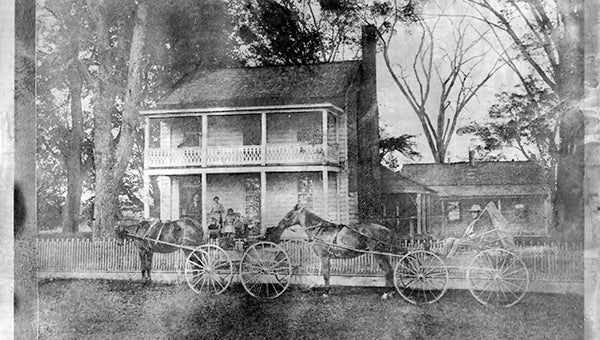The murder of Grac Jones: Chapter 1
Published 6:06 pm Saturday, July 25, 2015

The home of Catherine Bradshaw Vaughan stood on what is now Glen Haven Drive. The old man on the porch is believed to be Zachary Holland.
The miser’s will
EDITOR’S NOTE: On the evening of Oct. 26, 1908, five shots rang out in the village of Holland. Tiberius Gracchus “Grac” Jones lay dying on the ground inside the gate leading to his home. “They have killed me and killed me for telling the truth,” he told a friend as his life ebbed away. This is the first in a series of articles about the Jones murder case. Suffolk historian Kermit Hobbs Jr. compiled the 18-part series from personal accounts, newspaper stories and court records he has studied from the period.
In the mid-1800s, Augustus H. Holland operated a store in western Nansemond County, on the old stage road that ran from Portsmouth to South Quay. Holland was a descendant of the Holland family that had long ago received land grants in the area, and he had inherited a tract of land where he farmed and built his store.
According to local folklore, Holland had a bell mounted outside his store so that when customers came, they could call him from the fields by ringing the bell.
The region around Holland’s store became known as Holland’s Corner, and after the coming of the Atlantic and Danville Railroad in the late 1880s, a community developed there that was given the name “Holland.”
Augustus Holland had three sons, William, Zachary and Augustus Jr., and a daughter, Catharan. After the outbreak of the Civil War, Augustus Jr. enlisted in the 14th Virginia Infantry, and he was killed at the Battle of Malvern Hill on July 1, 1862.
Zachary had initially made his living as a schoolteacher, but after the war he bought the family’s store and 50 acres of adjoining land from his father, Augustus Holland Sr. When Augustus Sr. died some time later, his estate was divided between William, Zachary and Catharan, with the majority ultimately going to William.
Zachary felt that William had cheated him out of his rightful share of the inheritance, and he harbored bitter feelings against William for the rest of his life.
Over the years that followed, “Zach” amassed a considerable fortune. He lived a prudent lifestyle that reflected little evidence of his true worth, but he often lent money to people of the community. Zachary Holland was respected for his long years as a prominent citizen of the town.
But because of his grudge against his brother William, Zach frequently declared that no member of William’s family would ever receive a cent of his money.
As a young man, Zachary had fallen in love with his cousin, Catherine Bradshaw, and he had asked for her hand in marriage. Miss Bradshaw loved another man and rejected his proposal. She later became Mrs. Catherine Vaughan.
It was to Zach’s credit that even after Catherine’s marriage, he continued to be a close friend to the Vaughan family.
Catherine Vaughan eventually had several children, the oldest being a daughter, Gertrude. “Uncle Zach” was particularly fond of “Gertie,” and as she grew older he showered her with expensive gifts and paid for her schooling and music lessons. Soon after Gertrude’s 18th birthday, Zach asked for her hand in marriage. But following the example of her mother, Gertrude politely declined.
Zach, perhaps realizing that their pairing would have been an unlikely match, accepted Gertrude’s rejection and continued to befriend the Vaughan family. Indeed, it was not long afterward that he informed Gertrude that he intended to provide liberally for her wellbeing after his death.
He prepared a will, double-sealed in two envelopes, the outer one being labeled, “The last will of Zachary T. Holland. Not to be opened until after my death.” He presented the will to the young lady; she accepted it and placed it safely in her trunk.
Gertrude’s mother, Catherine, knew of the will but was always uncomfortable with Gertrude’s having it. Eventually Catherine fell into poor health and as she was dying, she insisted that Gertrude promise that upon her marriage, she would return the will to its donor.
Soon after her marriage to John “Jack” Smith, Gertrude obediently called “Uncle Zach” to her home and gave him back the will she had kept hidden away for the previous four years. That day was Feb. 3, 1908.
TUESDAY — Chapter 2: The will revealed







